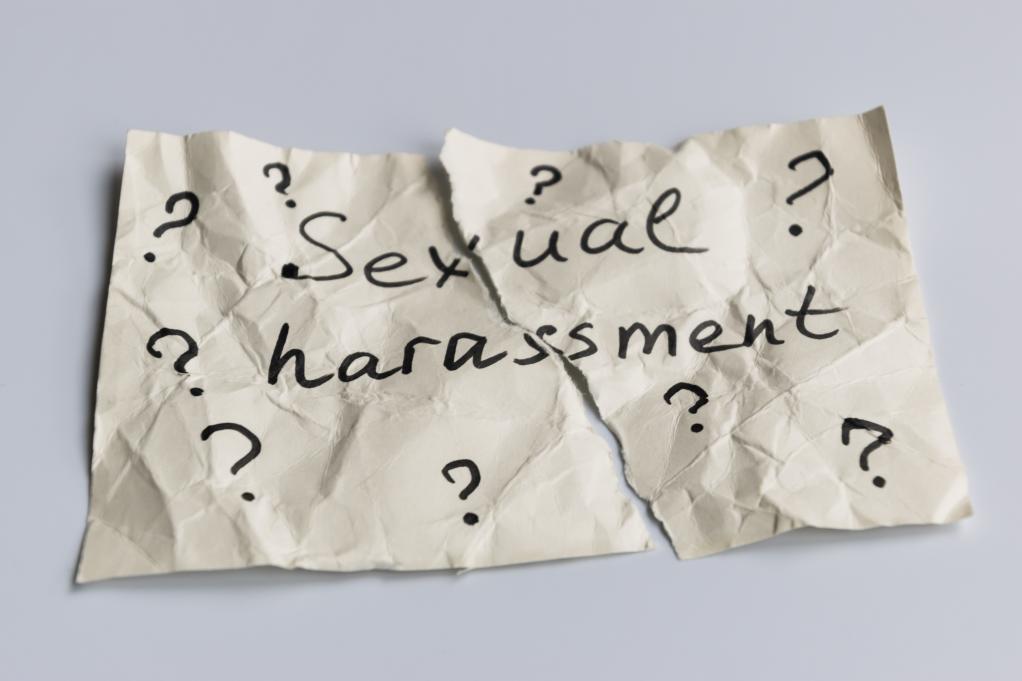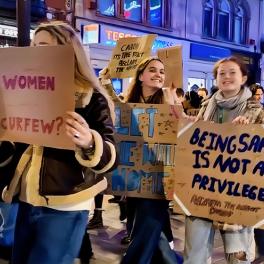
Please note: this article includes sensitive topics that some people might find difficult.
My first experience of ‘catcalling’ occurred in my early teenage years.
I walked to my secondary school every day, with other female friends, along a fairly busy main road and, from the age of 13 or 14, we would regularly receive whistles, honks and shouts from men passing in cars.
At first, I wasn’t worried, thinking it was a normal thing for girls to experience; to some extent, I think I found it exciting and flattering that people were noticing me and my appearance.
However, as I got older and had more frequent, intense experiences of catcalling and verbal harassment, it started to impact me more negatively.
Once, aged 16, walking back from the train station alone, I was followed by someone in a white van. It kept looping back to drive past me slowly as the man inside stared at me. This time, I felt threatened, not flattered, and I panicked about what might happen as I walked faster and faster back home.
Thankfully, the man either lost interest or lost sight of me, as I walked down a side road to my house – but although nothing more sinister actually took place, I was left feeling vulnerable and anxious.
In the following weeks, I found myself turning the incident over and over in my head: wishing I hadn’t been wearing a short dress, questioning his intentions and what might have happened if I had walked a different route, or whether he was just trying to scare me.
I began to understand that this man, and other men who had called to me on the street, saw me not as a person, but as a sexual object to be looked upon for their pleasure.
As I got older and started to attend parties and music events where alcohol and other drugs are more prevalent, I found that harassment became more common. In these sorts of spaces, I have experienced unwelcome groping and unsavoury comments about my body from male strangers.
One particularly memorable incident occurred at a daytime street party in London when I was 19. It was a hot day and I was wearing a mildly revealing top (nothing I would not have worn around my parents), and throughout the day had noticed countless men walk by me to stare only at my chest, and make some sort of derogatory comment about me.
For some, perhaps, it was an attempt to flirt or flatter, but it made me feel self-conscious and increasingly anxious.
That afternoon, when walking through a packed crowd, a large male stranger made eye contact with me, grabbed onto my arm and forcefully pulled me towards him, before pressing his sweaty body into mine in an attempt to dance, while I struggled to free myself from his arms which he had anchored around my waist.
In hindsight, I realise this was not a sinister incident – a drunk man had seen me, found me attractive, and wanted to dance with me. But it had felt far more overwhelming, as a physically powerful male felt entitled to grab and touch and hold my body, because he saw me not as a person but, again, as a sexual object, existing for his gratification.
Most of my female friends have had similar experiences.
A multitude of experiences of male harassment over the past few years has made me, and I expect many other young women, feel wary and uncomfortable around men, particularly when on my own in public places.
Not only this, but I think it has also had a significant impact on my self-worth and self-image, as these incidents wrongly taught me that women are too often valued and judged only for their appearance.
Confusingly, I have come to simultaneously resent the men who view me and other women as objects for their consumption, while becoming increasingly concerned with my appearance and how desirable I look to others. Though I feel threatened when I am publicly objectified by men, at times, when I don’t receive this unwanted attention, I worry that I appear unsexy, undesirable, and worthless.
The female experience from a young age of male harassment is problematic on a number of levels. Not only can it make women feel unsafe, anxious and violated in public places, but it teaches girls that their immediate value to the world lies in their sex appeal, which can invite a lifetime of insecurity and body image issues.
We should teach boys and young men that their ‘flattery’ of strangers can have a detrimental impact on the people they objectify, and we should teach girls that their worth lies not in their ‘sexiness’, but in their talents, qualities and abilities.
The lesson, in the words of Erin McKean, is that, ‘prettiness is not a rent you pay for occupying a space marked female’.
More for you
Support Young Creators Like This One!
VoiceBox is a platform built to help young creators thrive. We believe that sharing thoughtful, high-quality content deserves pay even if your audience isn’t 100,000 strong.
But here's the thing: while you enjoy free content, our young contributors from all over the world are fairly compensated for their work. To keep this up, we need your help.
Will you join our community of supporters?
Your donation, no matter the size, makes a real difference. It allows us to:
- Compensate young creators for their work
- Maintain a safe, ad-free environment
- Continue providing high-quality, free content, including research reports and insights into youth issues
- Highlight youth voices and unique perspectives from cultures around the world
Your generosity fuels our mission! By supporting VoiceBox, you are directly supporting young people and showing that you value what they have to say.





